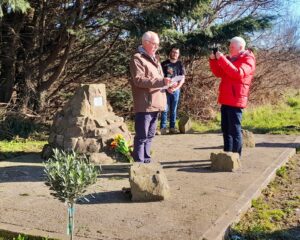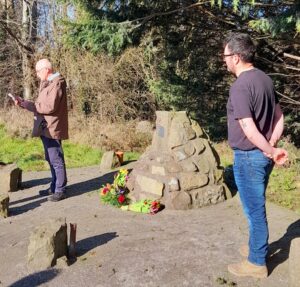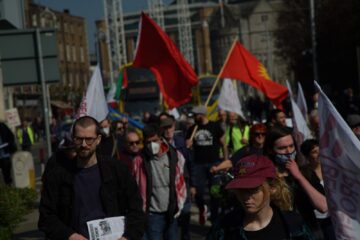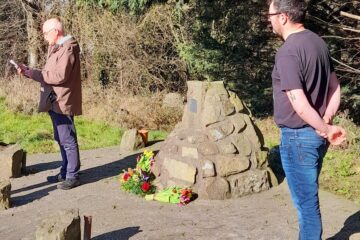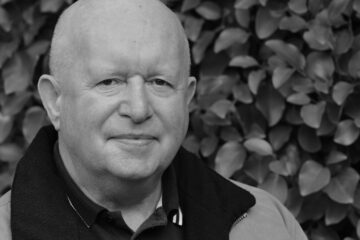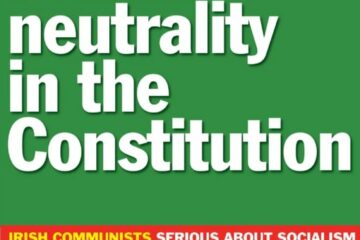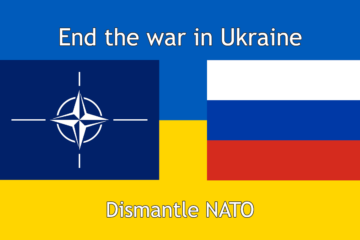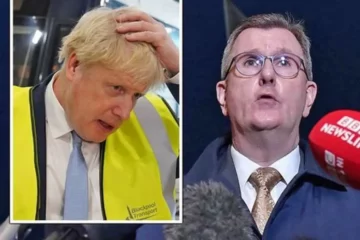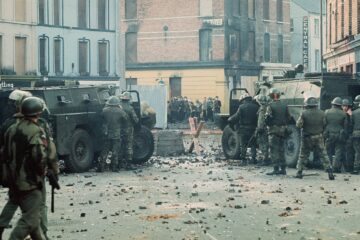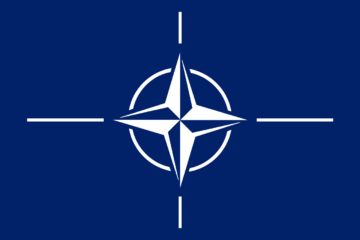Dear comrades and friends,
First of all I would like to thank the Monaghan 1916 Society for the invitation to speak here today at this memorial to Ben Murray, volunteer in the International Brigades in Spain, who died fighting fascism.
As we stand here at this memorial to Ben Murray we should recall that this memorial is here because of the foresight and determination of our late friend and comrade Eddie O’Neill, who has left our ranks.
We remember Eddie’s contribution not just to building many such memorials around the country to those who left our country and travelled to Spain to defend the working people of Spain and Spanish republican democracy but also to remember Eddie’s contribution to the struggle against British imperialism.
Today the peoples and nations of Europe, and indeed the wider world, are closer to global war than at any time since 1962. The two largest countries in Europe are at war. The immediate cause was the invasion by Russia of Ukraine; but we, as revolutionaries, must look deeper at the events that led up to this war.
What lies at the heart of this situation is the expansion of NATO and its project to constrict its imperial competitor, Russia, by establishing large bases of troops and mass-destructive weapons along its western and southern borders, and the massive arming and training of Ukrainian forces and paramilitaries, especially by the British.
The situation is aggravated by the fact that overt fascism is well ensconced in the political system of Ukraine and in its military.
We need to understand these events and the role of imperialism in the events that are unfolding and draw upon our own lived experience of the role and nature of imperialist power and interference here in our own country.
We should know from bitter experience that British imperialism has a very casual relationship to truth and justice.
We should recognise crocodile tears when we see them from imperialist forces for the suffering of the Ukrainian people when we hear Johnson and Biden speak, forces deaf and blind to the suffering of the heroic Palestinian people and to the mass murder of the people of Yemen—forces that have blockaded Revolutionary Cuba for over six decades, imperialist forces that have overthrown left and radical governments, that have sanctioned nations and peoples that had the audacity to stand up for their sovereignty and independence, who simply want to build a better society for themselves and future generations.
We should recognise the hypocrisy of the Irish establishment figures such as Mícheál Martin and Leo Varadkar and their ilk, when they turned a blind eye to decades of violence and repression of the nationalist people in the Six Counties.
We should recognise the double standards of what calls itself a free press in our country, which ignored what was happening in the Six Counties for decades, which turned a blind eye to the British state-directed killings of ordinary nationalists as well as political opponents, active republicans.
Ben Murray was an Irish communist, an anti-fascist who died fighting fascism “in the heroic stand on the banks of the Ebro River” in 1938.
Ben Murray was born on the 19th of July 1895 in Enniskillen, the son of an RIC man, reared in the Methodist tradition. His family lived outside Aughnacloy, at Moy Bridge, Co. Tyrone.
Ben was only fifteen when he emigrated to Canada. Like millions of other young men and women, he got caught up in the First World War as part of the Canadian army, a war that the ruling class of Europe, and in particular the British ruling class, like to portray as some sort of heroic struggle for freedom and the independence of small nations, to cover up what it was really about: a barbaric inter-imperialist slaughter, a war to carve up the world between the victorious imperialist powers.
We witness this growing whitewashing of that barbarism here in Ireland as the shoneen establishment continue to ingratiate themselves with the British in their sham “shared history.”
Even some former republicans have increasingly fallen for such nonsense—all part of the process of involving the Irish people in increased militarism, closer links with NATO, and greater military co-operation and cohesion within the EU.
Ben Murray was made of better stuff. He had absorbed the experiences of his own people, he understood what had and was taking place here in Ireland as well as abroad.
Ben was clearly affected by what he experienced during that imperialist war but was also aware of events in Russia and the Bolshevik Revolution of 1917. He joined the Communist Party of Canada and set up his own local communist newspaper, living and working in Montréal until his return to Ireland in 1933.
He had the strength of character to see beyond the lies and propaganda. He came to the conclusion that we needed a better world, a better way to organise society, to build a better society for working people.
He believed in democracy in its fullest sense—not the narrow concept of getting an opportunity to put a tick beside a name every few years and then be told to stand back and leave the important decisions to those who know best.
No, Ben Murray believed in a much more radical democracy, one that embraces all aspects of people’s lives. He believed in economic democracy, where those who create the wealth—working people—should own and control all the wealth in society, wealth they produced, that the natural wealth provided by nature should belong to all.
He believed democracy should apply in all spheres of people’s lives: economic, political, social, and cultural.
Those high ideals of those who went to Spain eighty-six years ago should be the anchor that guides our actions today. A better world can only be achieved by the active struggle of working people today.
All of us standing here today to pay tribute to people like Ben Murray believe in a united Ireland, as Ben did; but we have to ask ourselves, What type of united Ireland do we want? Do we want a united Ireland controlled by rack-rent landlordism, both Irish and transnational banking capital? Do we want a united Ireland of low pay, precarious work, no security of what tomorrow will bring to your door?
Is the united Ireland we want one in which old people are afraid to turn on the heating to warm their homes, or haven’t enough money to buy the necessities of life? where their care is driven by the profit motive?
Do we want a united Ireland of poor health services and growing waiting lists, a health service controlled by private medical interests, insurance companies, and global health corporations; a united Ireland where our children still have to emigrate to find work, to find a future; a united Ireland where all carry the same passport as we board a ship or plane looking for a future somewhere else, still having to leave behind family, friends, and broken communities?
Is the united Ireland we want, or are struggling for, one of “more of the same”?
Some peddle the nonsense of “parity of esteem.” We have to ask, When have working people been treated with esteem or respect in this country, north or south of the British border?
Partition has failed. We have a century of experience to show that it has failed the majority of our people. A tiny rich minority have done very well, thank you. The current internal settlement has failed as Stormont stumbles and staggers, only sustained by the drip-feed of British money.
The Executive is little more than a gravy train dispensing largesse to its friends and supporters, further exacerbating sectarianism and division. The British pacification process has succeeded in drawing many of its former opponents into managing that pacification process.
We know that they use British resources to marginalise those who disagree, to control funding to secure political loyalty, to manufacture the required outcome—an outcome that only reinforces imperialist domination and control.
This same process operates within this state, as witness the daily abandonment of long-held principles by some too eager to be allowed to sit around the government table and divvy up the spoils.
I don’t believe we would be following in the footsteps or remaining true to the ideals of Tone, Pearse, Connolly, Mellows, if we accepted or curtailed our demands to simply a united Ireland if nothing changed for working people, if we accepted the continuation of this bankrupt, inhuman system.
Here we need to recall the words of James Connolly, written over a century ago, which still remain true:
“Ireland without her people is nothing to me, and the man who is bubbling over with love and enthusiasm for ‘Ireland’ and can yet pass unmoved through our streets and witness all the wrong and the suffering, the shame and the degradation wrought upon the people of Ireland, aye, wrought by Irishmen upon Irishmen and women, without burning to end it, is, in my opinion, a fraud and a liar in his heart, no matter how he loves that combination of chemical elements which he is pleased to call ‘Ireland’.”
Connolly and Pearse were not pursuing a romantic ideal or an abstract political theory: the demand for real democratic control in a sovereign, independent Irish republic was the practical and only means to secure the needs and interests of the people of Ireland.
For them, as it should be for us, political and economic freedom are inseparable. One cannot be achieved without the other. These basic principles must guide our actions and shape our demands.
The united Ireland of tomorrow will be shaped and built by the demands we raise and the struggles and the resistance we organise today. We have to offer our people more than vague promises of maybe something better. We have to turn the vague aspiration of a united Ireland into concrete forms of struggle.
We have to return to Connolly and grasp the fundamental question: the unbreakable link between the national content of the class struggle and the class content of the national struggle.
I would recommend all gathered here today to get a copy of “A Democratic Programme for a New Ireland,” adopted and published by the Peadar O’Donnell Socialist Republican Forum to mark the centenary of the first Democratic Programme of over a century ago. I believe it is a good guide to action and presents a vision of a different Ireland for us all to work towards.
The central core of our strategy must be to bring working people into power. That is the legacy that Ben Murray and his comrades have left us to fulfil, as has the late Eddie O’Neill.
Now is not the time for despondency or carrying on as usual without learning from past struggles, nor to retreat into old ways of thinking. Ben Murray and Eddie O’Neill believed a better world was necessary and possible, a socialist Ireland. We need to organise ourselves to bring that about.

